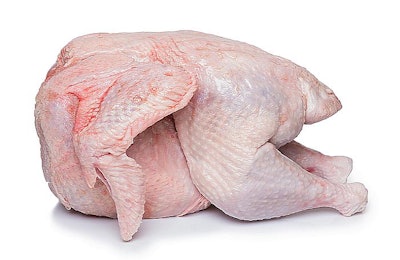
The Risk Assessment Unit of the Finnish Food Authority created a model to evaluate the roles of various food categories in causing human Salmonella infections, which found the poultry industry only accounted for a small percentage of all Salmonella cases in Finland.
Two-thirds of yearly human Salmonella cases of Finnish origin come from three specific subtypes.
“As evaluated by using the model, three subtypes of Salmonella with the relatively highest risk levels were Enteritidis 8, Newport and Enteritidis 1b. Turkey meat imported to Finland showed the relatively highest value as a source of infection”, said researcher Antti Mikkelä from the Finnish Food Authority.
Imported meat may cause slightly more Salmonella infections than meat produced in Finland in total, a press release from the Finnish Food Authority explained. The eating of imported livestock-based protein covers only a minor percentage of the consumption of Finnish meat in Finland.
Finnish beef may cause the highest percentage of Salmonella infections, the authority stated.
An in-depth look at the Finnish model
The model looked at categories including poultry (chicken and turkey), beef, and pork. Each product was split into categories based on its orientation, from Finland or imported. The food-based Salmonella infections assessed were between 2008 and 2015. In that time frame, the total number of cases was reduced in half from approximately 3,000. “The number of infections acquired from Finland varied from approximately 300 to 400 cases,” the press release explained.
The method compared at various subtypes of Salmonella diagnoses in people to types in food and animals. It also looked at the risk levels associated with the different types of salmonella.
“The major challenge ahead is extending the model so that more accurate laboratory methods, such as genotyping results, can also be used in connecting infections”, said research professor, Docent Jukka Ranta from the Finnish Food Authority.
Recent Salmonella prevalence in other countries
Sofina Foods Inc. is recalling Compliments brand chicken strips from the marketplace to avoid possible Salmonella illnesses, the Canadian Food Inspection Agency (CFIA) reported. The recalled product was sold nationally until May 1, 2019 but some consumers may still have it in their freezer. CFIA is verifying that the product has been removed from the marketplace.
The U.S. Centers for Disease Control and Prevention (CDC) has issued its final update on the outbreak of Salmonella Reading in the U.S. turkey industry. On April 30, 2019, the CDC issued a final update for its investigation into the outbreak of the Salmonella serotype which, according to its investigation, caused 133 hospitalizations and one death across 42 states.
The outbreak was linked to raw and ground turkey products and resulted in product recalls in 2018.
Rose Acre Farms’ new laboratory to test samples from the company’s flocks recently opened.
The second largest egg company in the United States opened the laboratory in a building it purchased two years ago near its corporate office in Seymour, Indiana, replacing the old lab near its former headquarters near Cortland, Indiana, reported the Seymour Tribune.
Following a renovation of the building, equipment was brought in in January, and the first tests were conducted on March 25.
At the facility, samples from Rose Acre Farms’ layer, breeder and pullet farms are tested for Salmonella enteritidis and other pathogens. Testing is critical as the operations recent voluntary Salmonella recall of over 2 million eggs in 2018.

















